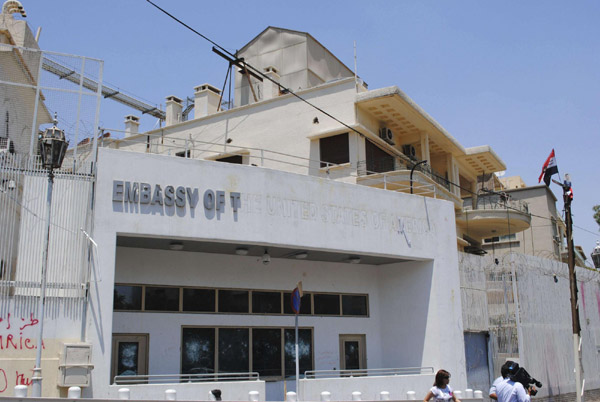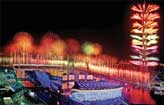Politics
US sharpens stance on Assad
Updated: 2011-07-12 14:25
(Xinhua)
|
 Members of the media stand outside the US embassy building in Damascus July 11, 2011. [Photo/Agencies] |
WASHINGTON/DAMASCUS - Washington significantly hardened its stance toward Syrian President Bashar al-Assad on Monday, while Syria's opposition mulls plans to set up a shadow government in case Assad leaves office.
US Secretary of State Hillary Clinton said Assad was "not indispensable" to the Arab country still reeling from nearly four months of domestic upheaval, after US and French diplomatic facilities in Damascus were attacked by some Syrians on the same day.
"From our perspective, he (Assad) has lost his legitimacy. He has failed to deliver on the promises he's made...Our goal is to see that the will of the Syrian people for a democratic transformation occurs," she told a joint press conference with visiting EU foreign policy chief Catherine Ashton.
Clinton also condemned the attacks and demanded Syria fulfill its international responsibilities of protecting diplomatic facilities.
Despite her tough rhetoric, Clinton stopped short of explicitly urging Assad to step down, insisting instead there is a "significant difference" between Syria and Libya.
The attacks were apparently triggered by the controversial visits by US Ambassador Robert Ford and French Ambassador Eric Chevallier to the opposition stronghold of the central Syrian city of Hama.
US State Department spokeswoman Victoria Nuland defended Ford's visit at a regular news briefing, saying it was "essential" for him to go there to meet some average people and talk to them.
The visits angered Syrian authorities, who said they amounted to an interference in Syria's internal affairs and fueled protests in that troubled area.
Amid the diplomatic row, Syria's opposition is mulling plans to form a shadow government, in anticipation of the end of Assad's rule.
Haitham al-Maleh, an 81 year-old former judge, said Monday that the opposition at a conference slated for July 16 in Damascus would form a shadow government of "independent, non-political technocrats." Shadow ministers would also be chosen at the meeting.
"It won't be an actual government, it will be a shadow government. It will be a regional government. Each minister will operate as a leading figure for his region," said Maleh, who was released from prison in March as political prisoner.
Its aim would be to guide opposition movements and anti-Assad protests, and ensure the country has an alternative administration ready for the collapse of the Assad government, he said.
"The most important duty of this government will be to get ready to take the helm once Assad steps down. So, when that happens, it will be poised to fill the gap and rule the country," he said.
Maleh was among 50 leading opposition figures who boycotted a national dialogue which opened on Sunday and was initiated by Assad, citing the government's failure to meet their demands for peaceful demonstrations, public freedom and release of political detainees.
With the absence of prominent opposition representatives, a two-day consultative meeting agreed on Monday to form a legal committee to make full revision of the current constitution.
A final statement wrapping up the meeting said participants put forward suggestions that would contribute to building a pluralistic and democratic state to guarantee the people's basic rights.
They also decided to keep in touch with "other national figures" who would take part in the preparations for the coming national dialogue conference in Syria.
The unrest in Syria has prompted the need for national dialogue. However, opposition activists, most of whom live outside Syria, say it's too late for any effort to bridge the gap between the government and the protesters.
The activists said security forces have killed more than 1,400 people across the country since the beginning of the unrest in mid-March, while the authorities dispute the toll, putting the blame for the unrest on gangs and armed groups that aim to foment sectarian strife in the country.
E-paper

Burning desire
Tradition overrides public safety as fireworks make an explosive comeback
Melody of life
Demystifying Tibet
Bubble worries
Specials

90th anniversary of the CPC
The Party has been leading the country and people to prosperity.

Say hello to hi panda
An unusual panda is the rising star in Europe's fashion circles

My China story
Foreign readers are invited to share your China stories.
